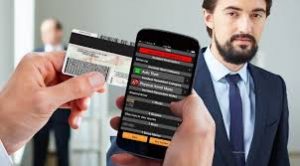ABC Cops are Searching for Fake IDs Holders via Apps
NEWSThe police and special agencies started to use Apps to define certain locations of underage drinking breakers who use Fake IDs.
Fake ID vendors come up with new tricky and sophisticated methods to produce fraudulent documents, but alcohol enforcement officers found a way how to spot fake IDs in some states. They use peculiar Apps to scan driver’s licenses for instant detection of fakes.
“We’ve never been able to determine fake IDs by our visual check before,” says Rusty Hanna, Mississippi Alcoholic Beverage Control’s enforcement chief.
Hanna’s Department uses an Age ID app that is made by the app’s developer, Intellicheck. The identity card is scanned by a barcode, and the number is entered in a database, containing information from the Department of Motor Vehicles of each state. This method allows verifying the information immediately. The data is updated almost every month.
The penalties for minors, who were discovered by officers while they were using fake documents somewhere, vary. The selection of punishment actually depends on the age of the arrested person, the type of crime and the state where the forged ID was used. Minors usually receive a subpoena to pay a fine. The penalty, in some cases, can reach $1,000. There are some states that can send underage drinkers to jail for a while.
A 2016 study conducted among college students found that about two-thirds minors used bogus documents to buy alcohol bypassing age restrictions. The researchers added that underage students are at risk, who can easily become addicted to alcohol and drugs.
Fake IDs
The legal drinking age was decreased in the 1960s throughout the U.S. from 21 to 18. After that, young people began to get into accidents after drunk parties. So, the government decided to return the previous Age and passed the Federal Uniform Drinking Age Act. This law required most states to raise the legal age to 21 again. Almost every state eventually complied.
Some students, who need to get a fake ID, produce it themselves with the help of software, a special printer and laminator.
Others prefer to order and purchase fake documents through the Internet. Minors can buy a quality novel fake card with several levels of security, including barcode, magnetic strips, protecting holograms; everyone needs only go to the website-stores that make it better than any handmade thing. Many these online shops are located in China, as ABC officers report.
The price of a fake ID varies from $70 to $300. Poor students can’t afford to buy it, so they get together in groups and make a common order, in that case shops give them a big discount. The more you order, the cheaper the cost of one card.
Officials warn minors to be cautious when they disclose personal information and credit card number to foreign firms, that may turn out to be frauds and use student’s information for their own purposes (steal money).
Alcohol law enforcement says the high-tech world has made fake identification documents more secure to identify. In recent years, the quality of a fake ID card has been improving, which means that sellers are finding new ways to make it look like a genuine one.
The police used to call headquarters to check IDs. It could take 3-5 minutes per person at least. It was a long process. Officers now use the Age ID app and can identify an entire group of students within 1-2 minutes.
Hanna, the chief officer, reported that more than 20 members of her Department were using the App. The number of arrests for having phony documents have increased from 256 to 388, compared to last year. She also noted that the Age ID App is not 100% reliable. In rare cases, it does not work correctly and fails.
Alternative Ways
ABC employees are promoting the idea of using the app to determine fake IDs. But not everyone believes this method is the best. Some agencies rely on standard portable document verifiers that have been widely used in the past.
For example, the Department of Alcohol Control in Vermont compared both methods and decided to choose the second with portable verifiers instead of applications. The head of the Department, Skyler Genest, suggests that the App-scanner is not so accurate in detecting fakes.
The State Alcohol Agencies are quite satisfied with the work of the Apps. Many officers find this device be very helpful for the determining of counterfeit documents.
See also:

No comments yet.